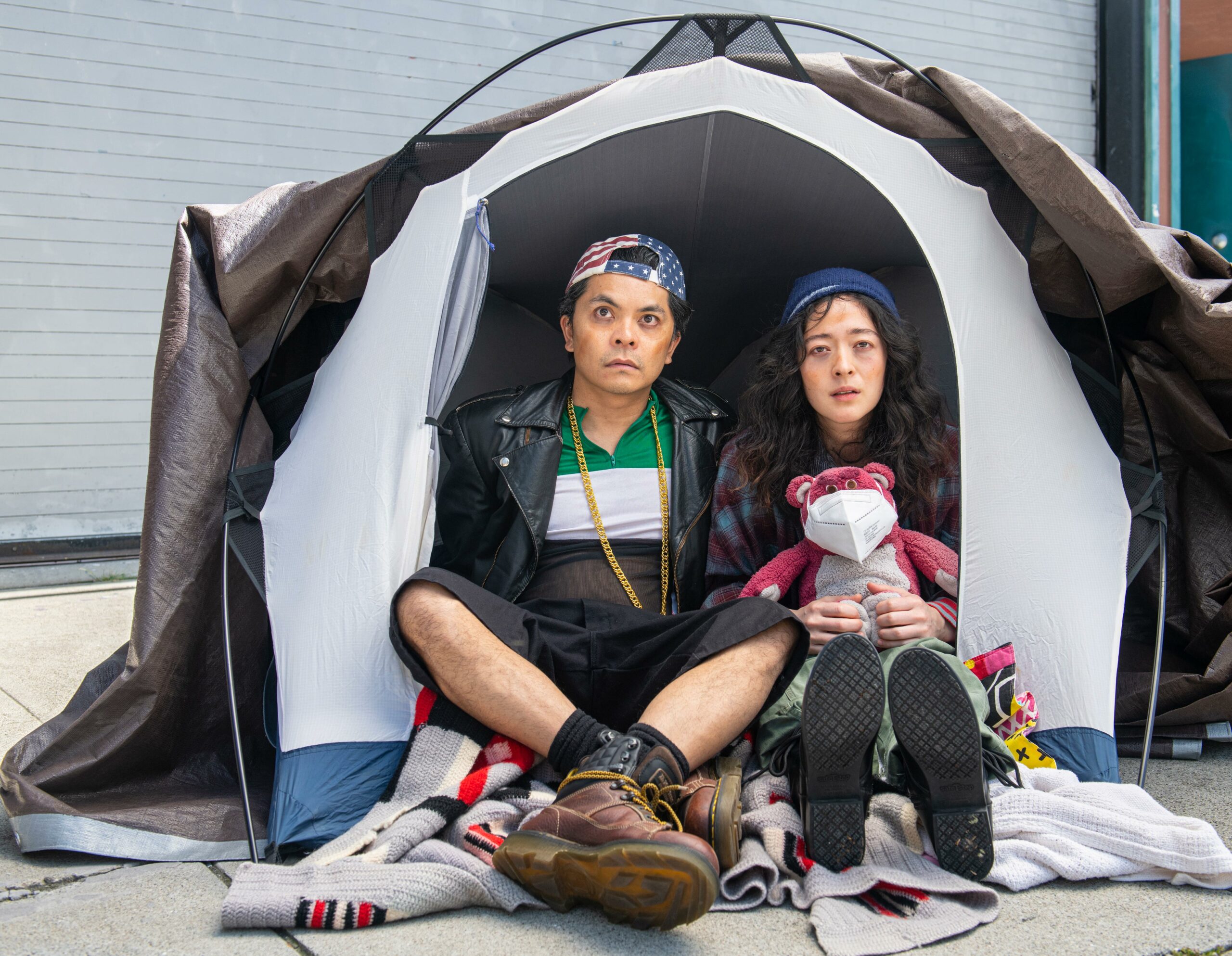From the outside looking in, San Francisco appears headed toward a civic breakdown. Stories of smash-and-grabs dominate headlines, and reports of filthy streets paint a crappy—if perhaps distorted—picture of the city. Meanwhile, doom loopy visions of economic disaster conveyed by the media (sorry!) only perpetuate this narrative.
But the city’s proverbial urban decline is not just the fixation of right-wing media and San Francisco’s haters. Artists are getting in on the discussion, too. Collapses of the mental, civic and economic kind are all the subjects of San Francisco Mime Troupe’s aptly titled Breakdown, a new musical satire that the 64-year-old theater collective premieres in Berkeley on Saturday. The production will then be performed in parks around the Bay Area, including San Francisco, through the beginning of September.
The show centers on three female characters: Yume, a homeless woman suffering from schizophrenia on the streets of San Francisco; Saidia, her social worker who is caught between advocating for her clients and bureaucratic tangles of red tape; and Marcia Stone, a Fox News commentator sent to the Tenderloin to portray the City by the Bay in a dire situation.
Written with a focus on addressing mental illness, the show primarily takes the perspective of Yume as an unhoused woman wrestling not only with the psychological and real-world challenges of her living situation, but also the broader societal issues surrounding San Francisco’s supposed unraveling. Michael Gene Sullivan, SF Mime Troupe’s resident playwright, and Marie Cartier, a collective member and social worker, co-wrote the show. (Contrary to its name, the Mime Troupe actually sings and speaks out its shows in an exaggerated style to point out the absurdities of daily life and often politics.)
“This feeling that everyone is sort of on the brink of a breakdown right now felt really relevant,” Cartier said.
“The reason we called it ‘Breakdown’ was a single character can have a breakdown, a system can have a breakdown, a culture can have a breakdown,” Sullivan said. “San Francisco is kind of on the edge to a certain extent,”
He believes that SF’s doom loop is not merely a symptom of businesses exiting Downtown, but a much deeper existential crisis facing the city. Whereas other metropolises like Los Angeles may produce films for entertainment or specialize in finance or trade, Sullivan sees a city that lacks a civic point and tries too hard to apply a suburban mindset to handling big-city issues.
“San Francisco doesn’t have an identity anymore. […] In my opinion, it has become the suburb of Silicon Valley,” Sullivan said. “So what do we make? What do we do? Why are we here? Until we reinvest in the thing that we can do, which is culture, we don’t have a purpose, and we’re just a jumped-up suburb.”
He also thinks that the city has kowtowed to the whims of corporate interests and tech moguls.
“Right now, the United States in general and San Francisco in particular has very much defined itself by how it treats the best off, how we take care of those who least need us to take care of them and to make sure to keep Elon Musk happy,” Sullivan continued, “and that is a horrible way to define yourself.”
But SF Mime Troupe isn’t merely riding a wave of anti-SF rhetoric—nor is it glossing over the city’s problems. While San Francisco’s bleaker elements are underlined in the show, the collective, which presents theater from a vocal and decidedly working-class perspective, aims to reframe the prevailing doom loop narrative of San Francisco.
How? Firstly, by humanizing stories like Yume’s and Saidia’s, putting a face on beleaguered neighborhoods like the Tenderloin and calling out partisan media attempts that hold up San Francisco as an example of liberal policies gone terribly wrong.
“This attack on progressivism is part of a culture war,” Sullivan said. “We have to be able to not believe the hype about our own city.”
“People suffering is being twisted to fit a specific agenda, which is to blame left-leaning policies,” said Cartier, who pulled from her experiences working as a social worker to co-write the musical. “It felt really important to pick apart that narrative in this show, but then also just have a more grounded look at what social work is, what it actually looks like.”
Rather than depicting a heroic social worker who will do anything to save her clients or an apathetic cog in city hall’s wheels, Cartier opted for realism in co-writing the character of Saidia.
“She keeps it real on a level that can make other people uncomfortable because she’s seen a lot of things, and she understands some of the grimmer realities of the world, and she faces them daily,” Cartier said. “She knows what’s going on, whereas a lot of people around her are finding ways to ignore [the realities]. […] And she’s tired.”
But the Mime Troupe doesn’t wants to leave audiences feeling worn down and weary by San Francisco’s state of affairs. Rather, Cartier hopes audiences feel catharsis, and Sullivan wants San Franciscans to take a good hard look in the mirror and ask themselves how they want to define San Francisco for the future and make a change in the city rather than just complain about it.
“I feel it’s important that the revolution shouldn’t end onstage because it leaves nothing for the audience to do,” Sullivan said.
‘Breakdown’
🗓 July 1-Sept. 4
📍 Various locations
🔗 sfmt.org
🎟 Free unless otherwise listed | Donations encouraged | RSVPs required for some shows
